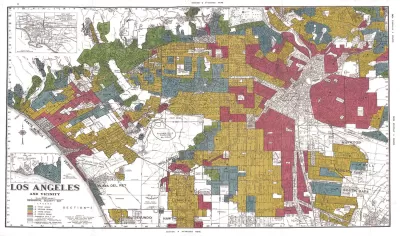New research and mapping projects reveal how the deeply embedded racism of planning and housing policies of the past are connected to the growing wealth gap of the present.

Mathew Leger provides insight into the widening wealth gap in the United States, with recent research connecting housing inequality to wealth inequality.
As Leger notes, past research has usually listed the following factors as the primary drivers of wealth inequality:
- Declining tax progressivity
- Technological advances
- Decline in union membership
- Decline in real value of the minimum wage, and
- Globalization
Recent studies by researchers at MIT, the University of Illinois, and the University of Michigan, however, "suggest that housing inequality is the leading cause of wealth inequality," according to Leger.
Further supplementing that point, Leger also shares word of a mapping project called "Mapping Prejudice," which visualizes the spread of racial covenants (i.e., property deeds excluding racial minorities from owning or occupying property) and redlining around Minneapolis during the 20 century.
Leger concludes by raising the possibility, and ongoing, question of whether the highly lauded Minneapolis 2040 comprehensive plan could achieve its ambitions of overcoming the racist history of property rights discrimination in the city.
FULL STORY: Map Monday: Ending Discrimination in Minneapolis Housing

Planetizen Federal Action Tracker
A weekly monitor of how Trump’s orders and actions are impacting planners and planning in America.

Canada vs. Kamala: Whose Liberal Housing Platform Comes Out on Top?
As Canada votes for a new Prime Minister, what can America learn from the leading liberal candidate of its neighbor to the north?

The Five Most-Changed American Cities
A ranking of population change, home values, and jobs highlights the nation’s most dynamic and most stagnant regions.

San Diego Adopts First Mobility Master Plan
The plan provides a comprehensive framework for making San Diego’s transportation network more multimodal, accessible, and sustainable.

Housing, Supportive Service Providers Brace for Federal Cuts
Organizations that provide housing assistance are tightening their purse strings and making plans for maintaining operations if federal funding dries up.

Op-Ed: Why an Effective Passenger Rail Network Needs Government Involvement
An outdated rail network that privileges freight won’t be fixed by privatizing Amtrak.
Urban Design for Planners 1: Software Tools
This six-course series explores essential urban design concepts using open source software and equips planners with the tools they need to participate fully in the urban design process.
Planning for Universal Design
Learn the tools for implementing Universal Design in planning regulations.
New York City School Construction Authority
Village of Glen Ellyn
Central Transportation Planning Staff/Boston Region MPO
Institute for Housing and Urban Development Studies (IHS)
City of Grandview
Harvard GSD Executive Education
Regional Transportation Commission of Southern Nevada
Toledo-Lucas County Plan Commissions





























